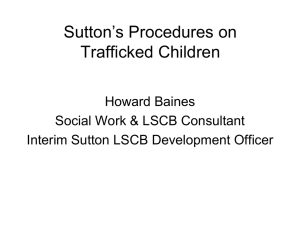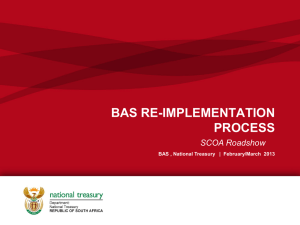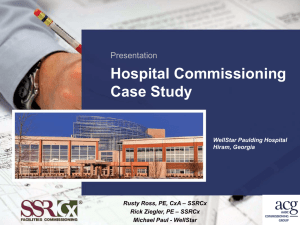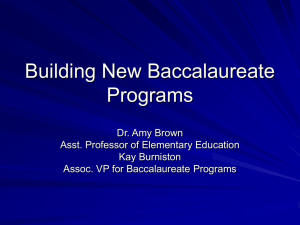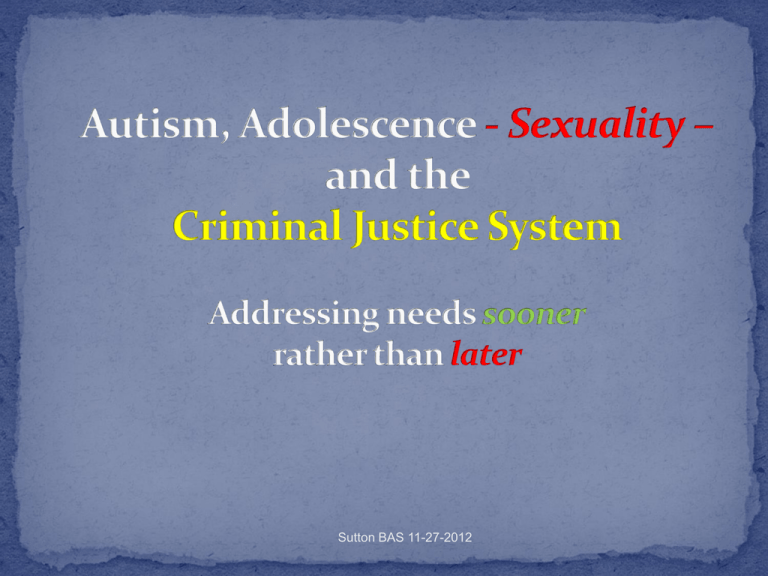
Sutton BAS 11-27-2012
Sutton BAS 11-27-2012
Sutton BAS 11-27-2012
Some of the individuals that I will be speaking about,
and their companions are individuals who have
learned about sex by being subjected to sexual
relations (sexual assault) as children themselves,
often times by loved ones or by people whom they
would associate as being important authority figures
in their lives when they were younger and despite the
fact that the sex may have hurt them at the time, in a
concrete and matter-of-fact way this is something that
someone does to someone else in a matter of fact
fashion to meet their sexual needs.
Sutton BAS 11-27-2012
State of the field
Ways to help including First Responders, training of
criminal justice personnel, educators
Attempts to respond – difficult climate….
Emerging best practice methods to address concerns
Identifying Individuals With Autism in a State Facility
for Adolescents Adjudicated as Sexual Offenders: A
Pilot Study
Sutton BAS 11-27-2012
Bill and his Mom (how the police responded)
Child pornography and the FBI
Jason and victory on the ball field
George making friends
Fixation on specialized interests Bobby and the
‘Thought Police”
But in some cases, Rick and not knowing what to do
next…
Sutton BAS 11-27-2012
Who Bill is – 6’,5” 356 pounds
Problem at transition program
302 three days later
Outcome
Sutton BAS 11-27-2012
One photo and FBI involvement, but…
Can you have an IQ of 135 and be considered
‘incompetent’?
2+2=4 but does 3+1 also =4??
Understanding what you’ve done and seeing the bigger
picture, is it possible?
Slamming the door and thinking all is now ok -
Sutton BAS 11-27-2012
Many are taught by family
Sutton BAS 11-27-2012
The case of Bobby and the bully’s
Lined up trains
Collected match box cars
Collected skate boards
Read about serial murders
Being bullied
Guidance Counselor’s offer of help (was it?)
Psychiatric evaluation
Sex offender treatment (despite no charge)
Clinical depression and intervention
Sutton BAS 11-27-2012
Are the disabled in these juvenile jails?
In 2004 I was told ‘no’ as I met a young man with
Asperger’s…this is what led to my work
Are there individuals with Intellectual disabilities in the
system
How is trauma assessed, or is it?
These are some of the specifics outlined in my YDC work.
Sutton BAS 11-27-2012
Are ‘best practices’ best for all adolescents?
NCYDC ASOP was (and maybe still is) the best for adolescent
sexual offending treatment in the eastern US, but are there
limitations for those with IDD?
Trauma – some good literature for some disorder, no
literature for how to treat – in or outside of criminal justice
– for IDD
MAYSI – supplement for Intellectual and other
developmental disorders needed.
What might Diversion look like?
Sutton BAS 11-27-2012
Sutton BAS 11-27-2012
Assessment for Mental Health and Drug and alcohol
use/abuse
But no clear assessment for Developmental disabilities
– autism and/or intellectual disabilities
No clear assessment for prior sexualized trauma of
residents
Sutton BAS 11-27-2012
3 Large Centers containing 9 independent programs
2 Forestry Camps
2 Specialty programs
One female program
Act 21 (ages 21 and over)
Sutton BAS 11-27-2012
Adjudicated Youth from ages 11 years to 20 years
Treatment offered for:
Mental health
Drug and alcohol abuse/dependence
Sexual offending
Sutton BAS 11-27-2012
All centered contained schools on site
Two psychiatrists in the State
No licensed doctoral level psychologist
Some Certified Addictions Counselors
Sutton BAS 11-27-2012
Double razor wire in the entrances
Located in remote areas of the State without direct bus
routes (making it difficult for regular visiting of family
or concerned others)
Heavy metal doors, stools and beds
Introduction to ‘best friends’
Sutton BAS 11-27-2012
(Is everyone who sexually offends another, a sex
offender??)
* Self-harm
* Depression and Bipolar Disorders
* Autism Spectrum
* Trauma
* Addictions
* Other Developmental Disorders
Sutton BAS 11-27-2012
Noted Developmental delays in:
Developmental History by age 3 or so (most important)
Language
Social
Behavior and Sensory
Sutton BAS 11-27-2012
46-54 Bed Units (5 cottages)
“0” diagnosed “Autistic” in 2004
‘Best Practice’ - Rehabilitation Program for
adolescent sexual offenders in existence for over 15
years
Rehab program uses traditional lecture format and
includes traditional group methods for instruction
(review of offenses, fantasy journals…) ((is this a
problem?))
Sutton BAS 11-27-2012
January –May 2007
One staff and three doctoral students – Duquesne
University School Psychology
Assessment to define limits and scope of the presence
and prevalence autism and other disorders
Treatment was provided in a limited sense
Sutton BAS 11-27-2012
Testing for:
Autism, Mental Status Examination and ASDS
Trauma – Childhood Trauma Questionnaire
IQ using WAIS, WISC, UNIT and WRAT
Auditory Processing using WJ
Mood/Personality – BDI, BHI, BASC, CBCL,
Sex Offender J-SOAP
Sutton BAS 11-27-2012
Diversion Project – BAS, BJJS, OMHSAS 2007-2008
The need for a different treatment approach – lessons
learned from NCYDC
Admission assessments to pair with MAYSI to look for
Autism and IDD (CARS II and BRIEF)
Behavioral approaches to shape in replacement
behaviors
Groupings/housing with others who have IDD
Limited group therapies
Loaded individual therapy and peer-peer therapy
Sutton BAS 11-27-2012
Training
First Responders
Court officials including DA and Public Defenders
Alternatives including Diversion
Re-visiting BAS RFI’s
Systems working in harmony
First responders
BAS ASERT Center project with EMS (Dr. John
McGonigle WPIC)
Indiana County ARC
Washington County Project
Sutton BAS 11-27-2012
Sutton BAS 11-27-2012
More Research defining “emerging best practices” for:
Identification – Duquesne’s current initiatives
The treatment those Developmentally Disabled People
who offend
To Divert them from Criminal Justice settings into
settings where they can learn alternatives to their
offending behaviors.
Sutton BAS 11-27-2012
Sutton BAS 11-27-2012


